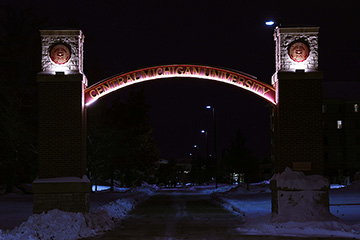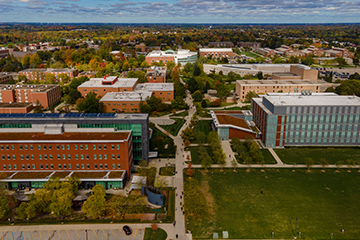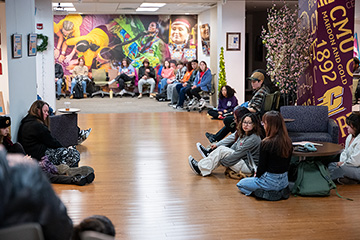Helping older people stay safe at home
Programs include fitness, fall risk assessments
A fitness program tailored to reduce falls among older people in mid-Michigan is the latest effort by Central Michigan University researchers to improve the lives of older people.
The program puts undergraduate students to lead residents in exercises intended to help them maintain their strength and balance. It incorporates 17 strength and balance exercises, said Dr. Jyotsna Pandey, a faculty member with the College of Medicine.
Known as GET (Geriatric Exercise Training) Fit, the program uses techniques pioneered in New Zealand in the late 1990s, Pandey said. Students leading the session receive service learning experience and valuable experience working with older people.
It’s expected to expand to assisted living facilities across mid-Michigan. It will be piloted starting with six facilities in Isabella County, in late September or early October, she said. Following this it may be expanded to other assisted living facilities in Midland, Gratiot and Clare counties will also participate.
Exercises through the program focus on strengthening legs, retaining balance and walking to improve stamina.
GET Fit could use a game of Bingo to entice seniors to participate in the program, Pandey said. In that case, seniors would be invited to play a game with occasional breaks to exercise.
The latest in fall safety programs
The program is CMU’s latest fall prevention program intended to improve the quality of life for Michigan’s older people.
CMU faculty have previously focused on helping older people reduce their risk of falling in their homes, she said.
The first program, Healthy Aging, provided CMU students the opportunity to go into the homes of older citizens and assess the risk of falls. Like GET Fit, it offered participating students an opportunity to provide a service to someone in a different generation.
As part of the fall-risk assessment, students worked older people with resources to make their homes safer, she said. The goal was to help seniors stay independent as long as possible.
“By the time a person falls, it’s too late,” she said.
The program also brought together students from three colleges – the College of Medicine, The Herbert H. and Grace A. Dow College of Health Professions, and social work students from the College of Liberal Arts and Social Sciences – to collaborate on a cross-disciplinary effort.
One of the other programs, ROAM Care, brought healthcare providers into senior homes through CMU’s mobile health unit.
“We thought, ‘Let’s bring the doctor’s office to their homes,” she said.
The other program provides emergency medical technicians with fall reduction information upon learning that many seniors who fell in their homes declined to seek additional aid.




